run flat CHEVROLET TAHOE 2022 Owners Manual
[x] Cancel search | Manufacturer: CHEVROLET, Model Year: 2022, Model line: TAHOE, Model: CHEVROLET TAHOE 2022Pages: 433, PDF Size: 7.37 MB
Page 15 of 433
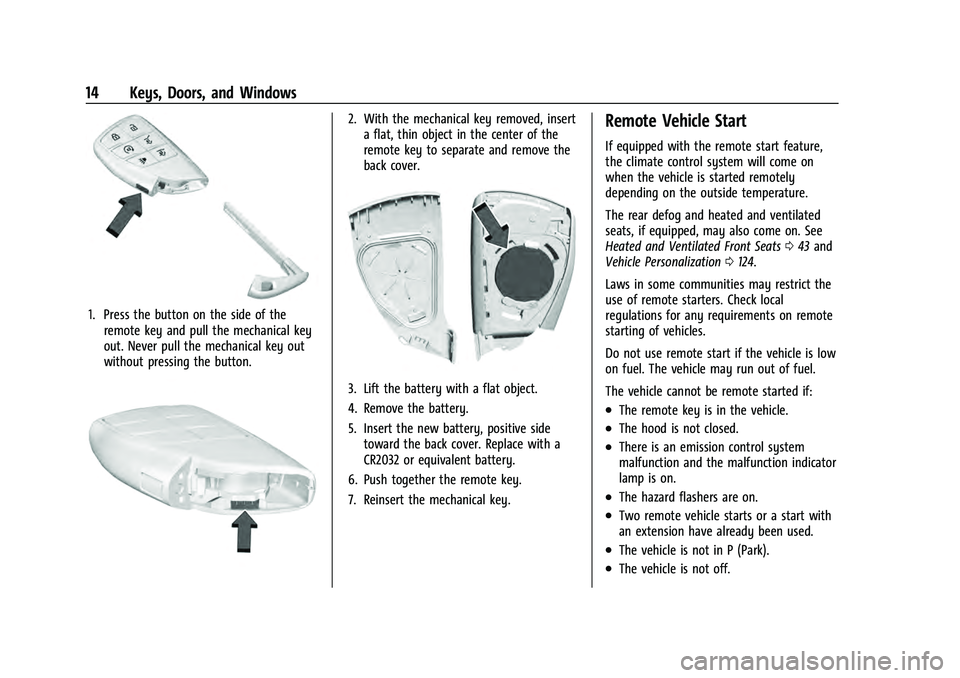
Chevrolet Tahoe/Suburban Owner Manual (GMNA-Localizing-U.S./Canada/
Mexico-13690484) - 2021 - crc - 8/17/20
14 Keys, Doors, and Windows
1. Press the button on the side of theremote key and pull the mechanical key
out. Never pull the mechanical key out
without pressing the button.
2. With the mechanical key removed, inserta flat, thin object in the center of the
remote key to separate and remove the
back cover.
3. Lift the battery with a flat object.
4. Remove the battery.
5. Insert the new battery, positive sidetoward the back cover. Replace with a
CR2032 or equivalent battery.
6. Push together the remote key.
7. Reinsert the mechanical key.
Remote Vehicle Start
If equipped with the remote start feature,
the climate control system will come on
when the vehicle is started remotely
depending on the outside temperature.
The rear defog and heated and ventilated
seats, if equipped, may also come on. See
Heated and Ventilated Front Seats 043 and
Vehicle Personalization 0124.
Laws in some communities may restrict the
use of remote starters. Check local
regulations for any requirements on remote
starting of vehicles.
Do not use remote start if the vehicle is low
on fuel. The vehicle may run out of fuel.
The vehicle cannot be remote started if:
.The remote key is in the vehicle.
.The hood is not closed.
.There is an emission control system
malfunction and the malfunction indicator
lamp is on.
.The hazard flashers are on.
.Two remote vehicle starts or a start with
an extension have already been used.
.The vehicle is not in P (Park).
.The vehicle is not off.
Page 221 of 433
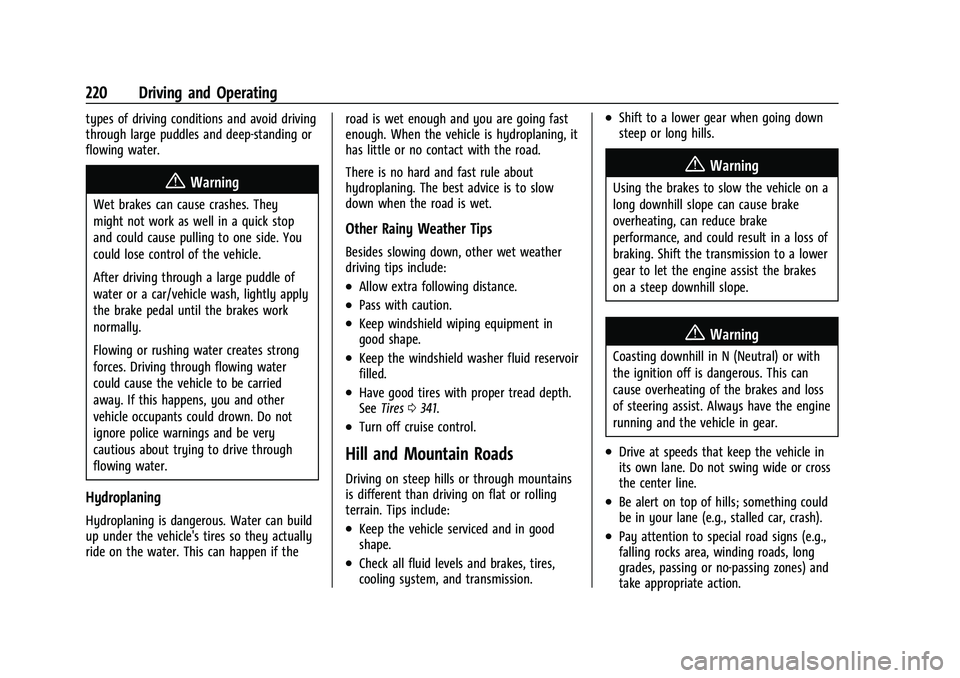
Chevrolet Tahoe/Suburban Owner Manual (GMNA-Localizing-U.S./Canada/
Mexico-13690484) - 2021 - crc - 8/17/20
220 Driving and Operating
types of driving conditions and avoid driving
through large puddles and deep-standing or
flowing water.
{Warning
Wet brakes can cause crashes. They
might not work as well in a quick stop
and could cause pulling to one side. You
could lose control of the vehicle.
After driving through a large puddle of
water or a car/vehicle wash, lightly apply
the brake pedal until the brakes work
normally.
Flowing or rushing water creates strong
forces. Driving through flowing water
could cause the vehicle to be carried
away. If this happens, you and other
vehicle occupants could drown. Do not
ignore police warnings and be very
cautious about trying to drive through
flowing water.
Hydroplaning
Hydroplaning is dangerous. Water can build
up under the vehicle's tires so they actually
ride on the water. This can happen if theroad is wet enough and you are going fast
enough. When the vehicle is hydroplaning, it
has little or no contact with the road.
There is no hard and fast rule about
hydroplaning. The best advice is to slow
down when the road is wet.
Other Rainy Weather Tips
Besides slowing down, other wet weather
driving tips include:
.Allow extra following distance.
.Pass with caution.
.Keep windshield wiping equipment in
good shape.
.Keep the windshield washer fluid reservoir
filled.
.Have good tires with proper tread depth.
See
Tires 0341.
.Turn off cruise control.
Hill and Mountain Roads
Driving on steep hills or through mountains
is different than driving on flat or rolling
terrain. Tips include:
.Keep the vehicle serviced and in good
shape.
.Check all fluid levels and brakes, tires,
cooling system, and transmission.
.Shift to a lower gear when going down
steep or long hills.
{Warning
Using the brakes to slow the vehicle on a
long downhill slope can cause brake
overheating, can reduce brake
performance, and could result in a loss of
braking. Shift the transmission to a lower
gear to let the engine assist the brakes
on a steep downhill slope.
{Warning
Coasting downhill in N (Neutral) or with
the ignition off is dangerous. This can
cause overheating of the brakes and loss
of steering assist. Always have the engine
running and the vehicle in gear.
.Drive at speeds that keep the vehicle in
its own lane. Do not swing wide or cross
the center line.
.Be alert on top of hills; something could
be in your lane (e.g., stalled car, crash).
.Pay attention to special road signs (e.g.,
falling rocks area, winding roads, long
grades, passing or no-passing zones) and
take appropriate action.
Page 370 of 433
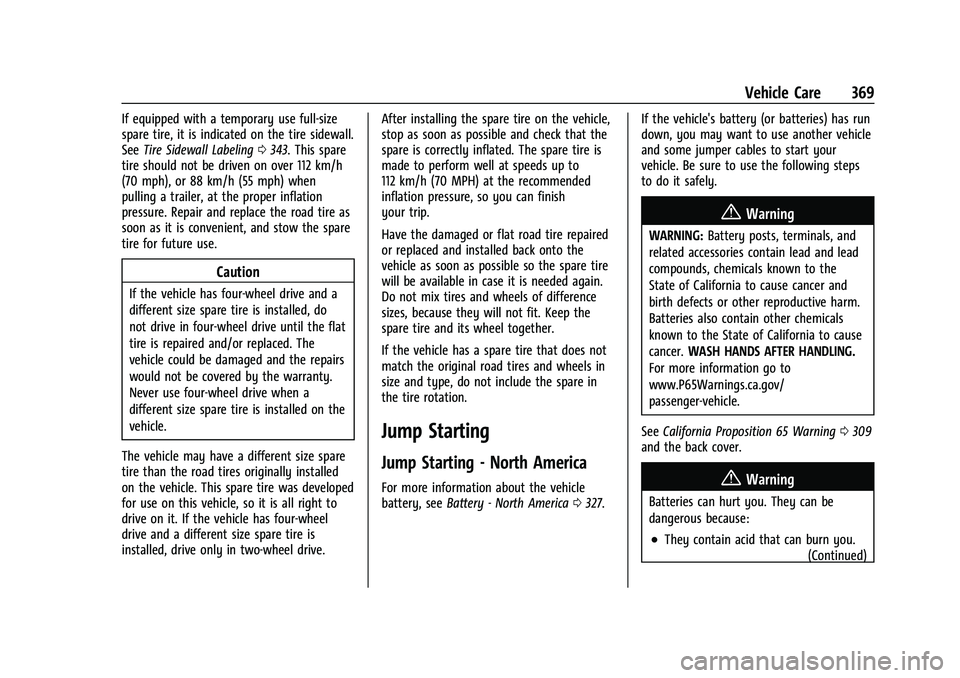
Chevrolet Tahoe/Suburban Owner Manual (GMNA-Localizing-U.S./Canada/
Mexico-13690484) - 2021 - crc - 8/17/20
Vehicle Care 369
If equipped with a temporary use full-size
spare tire, it is indicated on the tire sidewall.
SeeTire Sidewall Labeling 0343. This spare
tire should not be driven on over 112 km/h
(70 mph), or 88 km/h (55 mph) when
pulling a trailer, at the proper inflation
pressure. Repair and replace the road tire as
soon as it is convenient, and stow the spare
tire for future use.
Caution
If the vehicle has four-wheel drive and a
different size spare tire is installed, do
not drive in four-wheel drive until the flat
tire is repaired and/or replaced. The
vehicle could be damaged and the repairs
would not be covered by the warranty.
Never use four-wheel drive when a
different size spare tire is installed on the
vehicle.
The vehicle may have a different size spare
tire than the road tires originally installed
on the vehicle. This spare tire was developed
for use on this vehicle, so it is all right to
drive on it. If the vehicle has four-wheel
drive and a different size spare tire is
installed, drive only in two-wheel drive. After installing the spare tire on the vehicle,
stop as soon as possible and check that the
spare is correctly inflated. The spare tire is
made to perform well at speeds up to
112 km/h (70 MPH) at the recommended
inflation pressure, so you can finish
your trip.
Have the damaged or flat road tire repaired
or replaced and installed back onto the
vehicle as soon as possible so the spare tire
will be available in case it is needed again.
Do not mix tires and wheels of difference
sizes, because they will not fit. Keep the
spare tire and its wheel together.
If the vehicle has a spare tire that does not
match the original road tires and wheels in
size and type, do not include the spare in
the tire rotation.
Jump Starting
Jump Starting - North America
For more information about the vehicle
battery, see
Battery - North America 0327. If the vehicle's battery (or batteries) has run
down, you may want to use another vehicle
and some jumper cables to start your
vehicle. Be sure to use the following steps
to do it safely.
{Warning
WARNING:
Battery posts, terminals, and
related accessories contain lead and lead
compounds, chemicals known to the
State of California to cause cancer and
birth defects or other reproductive harm.
Batteries also contain other chemicals
known to the State of California to cause
cancer. WASH HANDS AFTER HANDLING.
For more information go to
www.P65Warnings.ca.gov/
passenger-vehicle.
See California Proposition 65 Warning 0309
and the back cover.
{Warning
Batteries can hurt you. They can be
dangerous because:
.They contain acid that can burn you.
(Continued)
Page 373 of 433
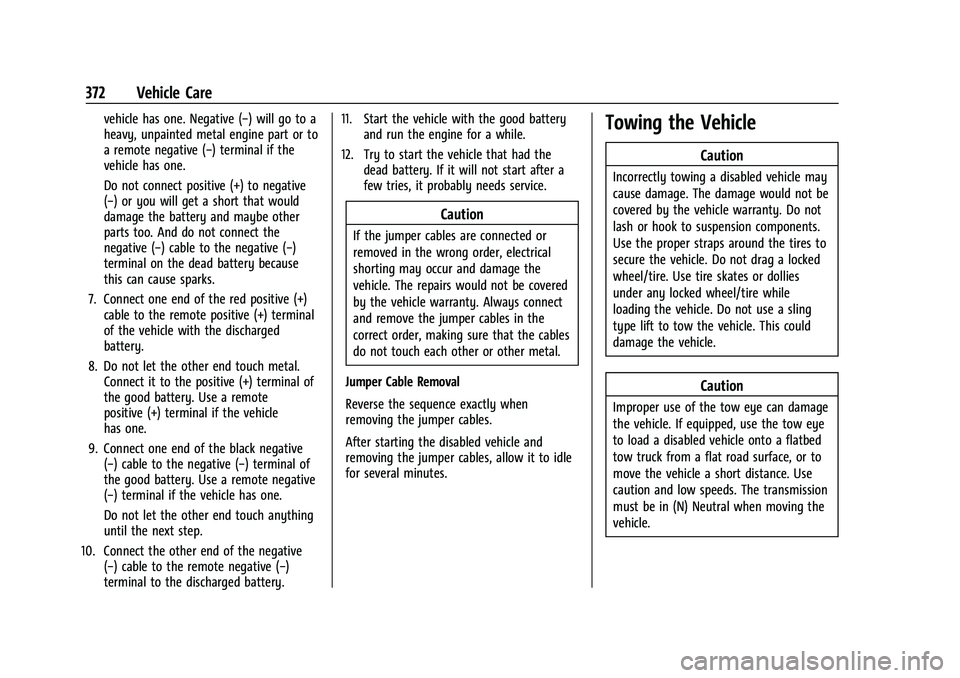
Chevrolet Tahoe/Suburban Owner Manual (GMNA-Localizing-U.S./Canada/
Mexico-13690484) - 2021 - crc - 8/17/20
372 Vehicle Care
vehicle has one. Negative (−) will go to a
heavy, unpainted metal engine part or to
a remote negative (−) terminal if the
vehicle has one.
Do not connect positive (+) to negative
(−) or you will get a short that would
damage the battery and maybe other
parts too. And do not connect the
negative (−) cable to the negative (−)
terminal on the dead battery because
this can cause sparks.
7. Connect one end of the red positive (+) cable to the remote positive (+) terminal
of the vehicle with the discharged
battery.
8. Do not let the other end touch metal. Connect it to the positive (+) terminal of
the good battery. Use a remote
positive (+) terminal if the vehicle
has one.
9. Connect one end of the black negative (−) cable to the negative (−) terminal of
the good battery. Use a remote negative
(−) terminal if the vehicle has one.
Do not let the other end touch anything
until the next step.
10. Connect the other end of the negative (−) cable to the remote negative (−)
terminal to the discharged battery. 11. Start the vehicle with the good battery
and run the engine for a while.
12. Try to start the vehicle that had the dead battery. If it will not start after a
few tries, it probably needs service.
Caution
If the jumper cables are connected or
removed in the wrong order, electrical
shorting may occur and damage the
vehicle. The repairs would not be covered
by the vehicle warranty. Always connect
and remove the jumper cables in the
correct order, making sure that the cables
do not touch each other or other metal.
Jumper Cable Removal
Reverse the sequence exactly when
removing the jumper cables.
After starting the disabled vehicle and
removing the jumper cables, allow it to idle
for several minutes.
Towing the Vehicle
Caution
Incorrectly towing a disabled vehicle may
cause damage. The damage would not be
covered by the vehicle warranty. Do not
lash or hook to suspension components.
Use the proper straps around the tires to
secure the vehicle. Do not drag a locked
wheel/tire. Use tire skates or dollies
under any locked wheel/tire while
loading the vehicle. Do not use a sling
type lift to tow the vehicle. This could
damage the vehicle.
Caution
Improper use of the tow eye can damage
the vehicle. If equipped, use the tow eye
to load a disabled vehicle onto a flatbed
tow truck from a flat road surface, or to
move the vehicle a short distance. Use
caution and low speeds. The transmission
must be in (N) Neutral when moving the
vehicle.
Page 424 of 433
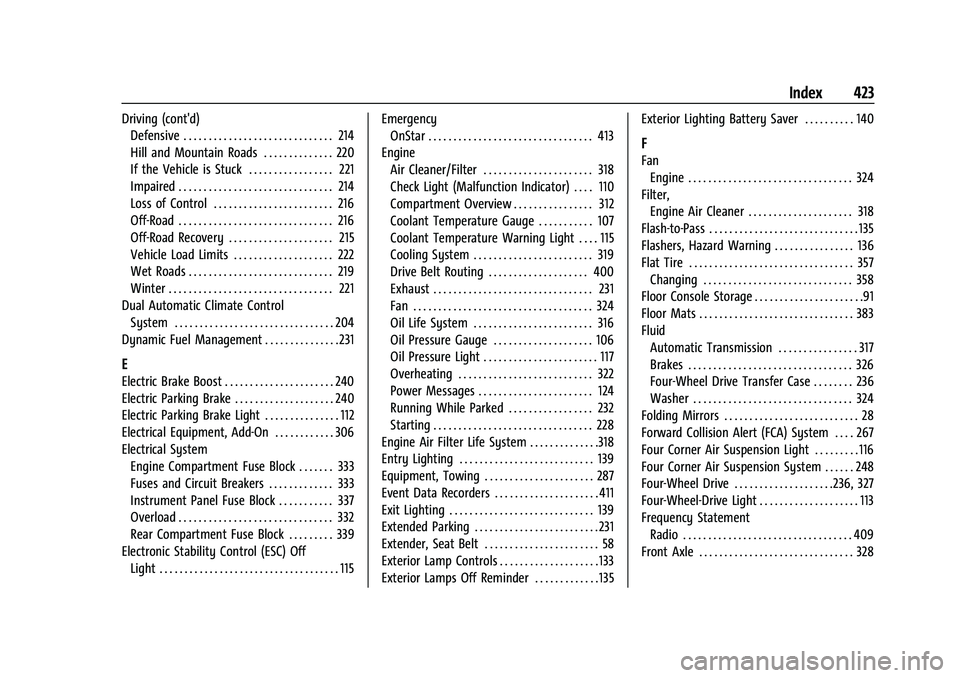
Chevrolet Tahoe/Suburban Owner Manual (GMNA-Localizing-U.S./Canada/-
Mexico-13690484) - 2021 - crc - 8/17/20
Index 423
Driving (cont'd)Defensive . . . . . . . . . . . . . . . . . . . . . . . . . . . . . . 214
Hill and Mountain Roads . . . . . . . . . . . . . . 220
If the Vehicle is Stuck . . . . . . . . . . . . . . . . . 221
Impaired . . . . . . . . . . . . . . . . . . . . . . . . . . . . . . . 214
Loss of Control . . . . . . . . . . . . . . . . . . . . . . . . 216
Off-Road . . . . . . . . . . . . . . . . . . . . . . . . . . . . . . . 216
Off-Road Recovery . . . . . . . . . . . . . . . . . . . . . 215
Vehicle Load Limits . . . . . . . . . . . . . . . . . . . . 222
Wet Roads . . . . . . . . . . . . . . . . . . . . . . . . . . . . . 219
Winter . . . . . . . . . . . . . . . . . . . . . . . . . . . . . . . . . 221
Dual Automatic Climate Control
System . . . . . . . . . . . . . . . . . . . . . . . . . . . . . . . . 204
Dynamic Fuel Management . . . . . . . . . . . . . . . 231
E
Electric Brake Boost . . . . . . . . . . . . . . . . . . . . . . 240
Electric Parking Brake . . . . . . . . . . . . . . . . . . . . 240
Electric Parking Brake Light . . . . . . . . . . . . . . . 112
Electrical Equipment, Add-On . . . . . . . . . . . . 306
Electrical System Engine Compartment Fuse Block . . . . . . . 333
Fuses and Circuit Breakers . . . . . . . . . . . . . 333
Instrument Panel Fuse Block . . . . . . . . . . . 337
Overload . . . . . . . . . . . . . . . . . . . . . . . . . . . . . . . 332
Rear Compartment Fuse Block . . . . . . . . . 339
Electronic Stability Control (ESC) Off Light . . . . . . . . . . . . . . . . . . . . . . . . . . . . . . . . . . . . 115 Emergency
OnStar . . . . . . . . . . . . . . . . . . . . . . . . . . . . . . . . . 413
Engine Air Cleaner/Filter . . . . . . . . . . . . . . . . . . . . . . 318
Check Light (Malfunction Indicator) . . . . 110
Compartment Overview . . . . . . . . . . . . . . . . 312
Coolant Temperature Gauge . . . . . . . . . . . 107
Coolant Temperature Warning Light . . . . 115
Cooling System . . . . . . . . . . . . . . . . . . . . . . . . 319
Drive Belt Routing . . . . . . . . . . . . . . . . . . . . 400
Exhaust . . . . . . . . . . . . . . . . . . . . . . . . . . . . . . . . 231
Fan . . . . . . . . . . . . . . . . . . . . . . . . . . . . . . . . . . . . 324
Oil Life System . . . . . . . . . . . . . . . . . . . . . . . . 316
Oil Pressure Gauge . . . . . . . . . . . . . . . . . . . . 106
Oil Pressure Light . . . . . . . . . . . . . . . . . . . . . . . 117
Overheating . . . . . . . . . . . . . . . . . . . . . . . . . . . 322
Power Messages . . . . . . . . . . . . . . . . . . . . . . . 124
Running While Parked . . . . . . . . . . . . . . . . . 232
Starting . . . . . . . . . . . . . . . . . . . . . . . . . . . . . . . . 228
Engine Air Filter Life System . . . . . . . . . . . . . .318
Entry Lighting . . . . . . . . . . . . . . . . . . . . . . . . . . . 139
Equipment, Towing . . . . . . . . . . . . . . . . . . . . . . 287
Event Data Recorders . . . . . . . . . . . . . . . . . . . . . 411
Exit Lighting . . . . . . . . . . . . . . . . . . . . . . . . . . . . . 139
Extended Parking . . . . . . . . . . . . . . . . . . . . . . . . . 231
Extender, Seat Belt . . . . . . . . . . . . . . . . . . . . . . . 58
Exterior Lamp Controls . . . . . . . . . . . . . . . . . . . . 133
Exterior Lamps Off Reminder . . . . . . . . . . . . . 135 Exterior Lighting Battery Saver . . . . . . . . . . 140
F
Fan
Engine . . . . . . . . . . . . . . . . . . . . . . . . . . . . . . . . . 324
Filter, Engine Air Cleaner . . . . . . . . . . . . . . . . . . . . . 318
Flash-to-Pass . . . . . . . . . . . . . . . . . . . . . . . . . . . . . . 135
Flashers, Hazard Warning . . . . . . . . . . . . . . . . 136
Flat Tire . . . . . . . . . . . . . . . . . . . . . . . . . . . . . . . . . 357 Changing . . . . . . . . . . . . . . . . . . . . . . . . . . . . . . 358
Floor Console Storage . . . . . . . . . . . . . . . . . . . . . .91
Floor Mats . . . . . . . . . . . . . . . . . . . . . . . . . . . . . . . 383
Fluid
Automatic Transmission . . . . . . . . . . . . . . . . 317
Brakes . . . . . . . . . . . . . . . . . . . . . . . . . . . . . . . . . 326
Four-Wheel Drive Transfer Case . . . . . . . . 236
Washer . . . . . . . . . . . . . . . . . . . . . . . . . . . . . . . . 324
Folding Mirrors . . . . . . . . . . . . . . . . . . . . . . . . . . . 28
Forward Collision Alert (FCA) System . . . . 267
Four Corner Air Suspension Light . . . . . . . . . 116
Four Corner Air Suspension System . . . . . . 248
Four-Wheel Drive . . . . . . . . . . . . . . . . . . . .236, 327
Four-Wheel-Drive Light . . . . . . . . . . . . . . . . . . . . 113
Frequency Statement Radio . . . . . . . . . . . . . . . . . . . . . . . . . . . . . . . . . . 409
Front Axle . . . . . . . . . . . . . . . . . . . . . . . . . . . . . . . 328